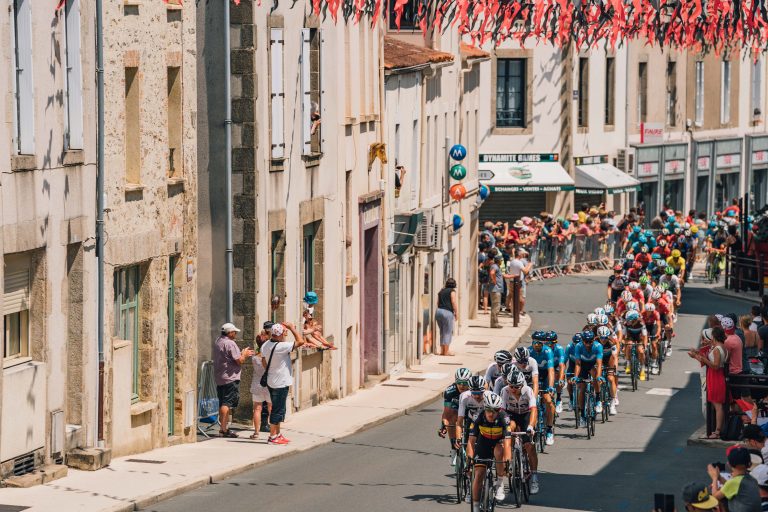In late July, Britain’s Geraint Thomas leisurely rode his bicycle along the Champs-Elysees, celebratory champagne flute in hand, and toasted his well-earned victory, and that of Team Sky, in one of the world’s most gruelling of sports events, the Tour de France.
Back at Dejero’s offices in Waterloo, there were a few toasts and high fives, as well. Dejero, its equipment and expertise had played no small role in the win, providing Team Sky with upgraded internet and communication connectivity for its vehicles throughout, giving the team’s support staff vastly improved ability to assist their eight riders and helping to put them, and Thomas in particular, in a position to succeed.
“It’s fair to say I watched with a great deal of interest,” said Rob Watters, Dejero’s Director of Sales for Europe, Middle East and Africa, speaking to Communitech News from the UK a few days after the race. Notwithstanding the fact that Watters is British, and admits to being rather pleased that a British rider won the storied race for the sixth time in seven years, Watters was additionally happy about Dejero’s role.
To understand the mission the company was tasked with is to understand the complexity of the event. The race winds for 21 days and 3,500 kilometres over some of the most daunting, mountainous terrain in Europe. Riders are followed by support vehicles; in Team Sky’s case, there were six vehicles in total, carrying spare parts, wheels, first-aid gear, laptops, communication equipment and the like. The problem teams face is reliable communication between vehicles, with riders, and with race officials, particularly through the mountain stages where connectivity turns spotty. The problem is compounded by the speed and scale of the event. Maintaining situational awareness about the state of the pack of riders strung out along the day’s route – who is leading, who is struggling, who is injured, plus looming changes in weather or road conditions – is difficult. Worse, the typical 20-to-30-second delay that accompanies any communication using, say, a typical cell phone, means that information is eons old by the time it’s received, relative to the speed of the riders.

Cyclists make their way through an unidentified French town during the
Tour de France last month. (Photo: Russ Ellis)
“They wanted to be in a position to have better information in real time,” explained Watters. “One of the things they identified is that the technology in those cars is very old-fashioned.”
Earlier this year, Dejero, which specializes in blending IP networks for video transport and Internet connectivity, particularly while mobile or in remote locations, was selected to provide Team Sky with a solution, the heart of which was its GateWay router. By making use of what Watters terms “bonded cellular,” in effect blending available cellular networks to create a robust communications infrastructure, the company was able to devise a network that allowed the team to monitor live TV feeds and track weather data and social media activity, all from within its vehicles. The system allowed the team to anticipate the route ahead of its cyclists, buying the team time in the event of crashes, injury or mechanical problems and to respond to changing conditions; 20-to-30 seconds of communications latency was reduced to three seconds.
“It opened our eyes to the potential of the product,” says Watters.
This year’s Tour de France was particularly frenetic, replete with upsets, crashes, role-reversals and, as is common with the Tour, controversy. At Stage 16, in the Pyrenees, French police mistakenly tear gassed some riders and spectators in response to a farmer’s protest along the route, creating chaos. Dejero’s equipment saw Team Sky through it all.
“Now that we have Dejero GateWay, and its ability to connect to multiple networks and devices, we have a much higher probability of creating a communications infrastructure that enables sharing of information as close to real time as possible, while the vehicles are moving at speed — more reliably and quicker than our competitors,” said Scott Drawer, head of the Team Sky Performance Hub, in a Dejero blog post.
Dejero’s support for Team Sky will continue throughout the duration of the Union Cycliste Internationale World Tour racing season, which consists of 37 road races throughout the world, and of which the Tour de France is a part.

